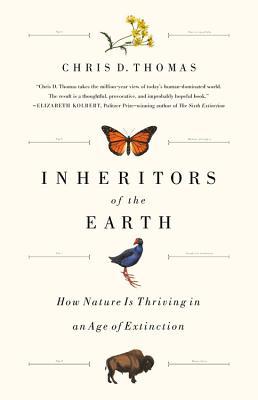
This book is chosen by Mary Mick, Life member of ONC.
When you think of The Anthropocene, do you focus on all the damage human beings have wrought on the natural world…pollution, climate change, deforestation and, of course, extinction (sometimes referred to as The Sixth Extinction)? Then, you will find Inheritors of the Earth, “provocative” and “shockingly contrarian”, as one reviewer has termed it.
Chris D. Thomas , the Author, is an ecologist and evolutionary biologist at the University of York, U.K. He does not minimize or excuse the damage humans have done to Planet Earth, but he focuses on Nature’s dynamism, resilience, and adaptations inherent in evolution. He also argues that humans have ,for too long, thought of themselves as distinct from Nature, and act as “referees and arbiters of how Nature should be”. There is no “correct” state of Nature he states, and humans (“the peculiar bipedal apes from Africa”) are part of it.
Citing the ‘success’ stories of diverse species such as the New Zealand pukeko and the ochre-coloured comma butterfly, he argues against the accepted story of declining biodiversity and posits that human activities have created new places for ‘enterprising’ animals and plants to live.
I especially liked the author’s many anecdotes from his extensive worldwide fieldwork which ranged from the Asian steppe to the Galapagos Islands to Ethiopia to Costa Rica etc. etc.; for instance, his hearing a familiar ,“cheep, cheep”, somewhere on the Asian steppe, and then describing the wild Bactrian sparrow’s journey around the world from its origin there , to becoming the common house sparrow which “conquered Asia and Europe thousands of years ago , inhabiting villages and towns from Portugal in the west to China in the east and from Sri Lanka in the south to Norway in the north”.
Yes, I suppose Thomas can be provocative at times. To give an example is when he asks why these same house sparrows “have been unfairly blamed for the imaginary decline of bluebirds?…………Is the reason simply that sparrows are clad in dowdy browns and greys and bluebirds are clothed in appealing iridescent red and blue or is it because sparrows are, as the Michigan Bluebird Society put it , ‘alien’?” WOW! Some might take offence at that!
I thoroughly enjoyed this book. It is thought-provoking, thoroughly researched, and clearly and persuasively argued. In future, I must try to use the term ‘introduced’ species instead of ‘invasive’, and try not to be disappointed that some grackles have decided to nest in our yard this year instead of the orioles.
Inheritors of the Earth can be found in the Orillia Public Library catalogue as an e-book. As well, one can access it using the Overdrive app from the Ontario Library Service where it is also listed as an e-book. New and used copies can be purchased through Amazon.ca
Thanks to Mary for the review, and to Heather Ewing, for information about how the book can be obtained.
